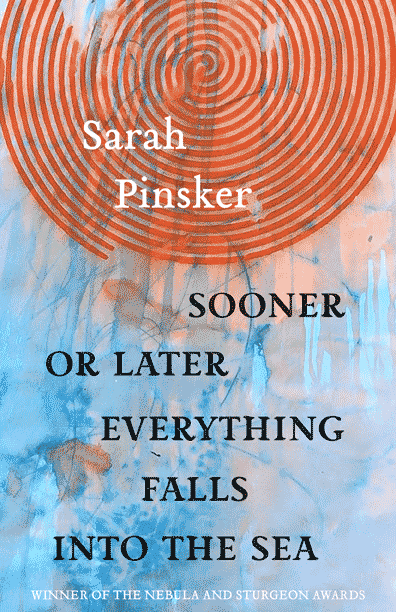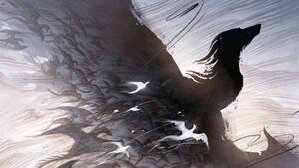Reviewing Sarah Pinsker’s story collection, Sooner or Later Everything Falls Into the Sea, is an exercise in self-frustration. The stories’ endings are too perfect to spoil, but they’re all you want to talk about: paragraphs, even single lines in which the emotions, plot threads, and big ideas tie off in one gutsy wrench that leaves you humming.
One non-spoilery observation: Pinsker’s stories tend to grab a hold of their characters in the midst of massive displacements. An aging punk rock band lives gig-to-gig out of the back of their van as live music shows go obsolete (“Our Lady of the Open Road”). A Jewish family flees persecution with their robot grandmother (“The Low Hum of Her”). Don’t ask me to summarize “The Sewell Home for the Temporally Displaced,” but you get the idea.
Each of these stories asks: Who will we be, when all this is gone? It’s a question at the heart of science fiction. Although the immediate threats of climate change make it feel more acute today, science fiction has from the beginning grappled with how technology destroys ways of life in the midst of building new ones. New tech pushes out old industries; it changes our odds against the body or our environment, and not always how we intend. In “Our Lady of the Open Road,” which won the Nebula in 2016, Pinsker’s punk rocker, Luce, sees this only too well: she’s keeping a stranglehold on her authenticity while canned holographic concerts replace the real thing, and it pisses her off:
We all shared the same indignation that we were losing everything that made us distinct, that nothing special happened anymore, that the new world replacing the old one wasn’t nearly as good, that everyone was hungry and everything was broken and that we’d fix it if we could find the right tools. My job was to give it all a voice.
And yet, in the collection’s title story, another rocker sees just the opposite: there’s something pathetic, even bankrupt, in clinging to ways of life that aren’t coming back. In a global collapse, the rich and famous take to cruise ships that try shamelessly to keep afloat the world they left behind: “They throw parties or they stage big collapses and recoveries. They produce documentaries about themselves, upload to the ship entertainment systems.” Gabby signs on but jumps ship after finding herself demoted to entertainment, pulling away in a lifeboat from “a foolish attempt to save something that had never been worth saving.”
Washing ashore half-dead, Gabby is taken in by Bay, who leads a hardscrabble life foraging from a cottage she should be sharing with her wife: she’s lost too much, too. But the clean, salty beauty of the story, and Bay and Gabby’s wittily drawn push-and-pull, suggest there’s new connection and meaning in their future. Similarly, in “The Low Hum of Her,” Tatiana never accepts her robot-grandma as a replacement for “the real Bubbe,” but there’s something rich and wondrous in their new partnership. Pinsker’s stories don’t trust the tech miracle that lets us get back everything we like, or better; but they believe strongly that there will still be something splendid for us to love. Not just consolation, but fulfillment, something unexpected and much too strange for our ancestors.
The best example of this—and maybe my favorite of the collection, but don’t make me choose—is the opening story, “A Stretch of Highway Two Lanes Wide.” Andy loses his right arm in a farming accident and is fitted with an advanced prosthetic. Except, impossibly, in the mirror, his brain sees instead of an arm, a road:
It didn’t just want to be a road. It knew it was one. Specifically, a stretch of asphalt two lanes wide, ninety-seven kilometers long, in eastern Colorado. A stretch that could see all the way to the mountains, but was content not to reach them. Cattleguards on either side, barbed wire, grassland.
Pinsker is still working in science fiction here: Andy’s friend theorizes his prosthetic is recycled from smart-road technology. And that’s what turns it from a clever twist on the Evil Hand story to something more. The hand is just different: something other than human, existing in itself. This mysterious self-containment is to me a much likelier face of our technological symbiosis than all the Singularity hoopla, and more wondrous, and more dangerous.
He had lived here his whole life, but his arm was convinced it belonged someplace else. On the way home it spoke to him without words. It pulled him. Turn around, it said. South, south, west. I am here and I am not here, he thought, or maybe it thought. I love my home, he tried to tell it. Even as he said it, he longed for the completion of being where he was, both Saskatchewan and Colorado. This was not a safe way to be.
Pinsker’s style is clean and intimate, rich with emotion, but not a single unearned sentiment. Her characters are lovable portraits of self-frustration: good, flawed people confronted with too much loss and liking none of their options, with a talent for creative destruction.
This is doubly, triply, N-ly true of the last story, “And Then There Were (N – One),” which I wrote up last year in our Nebula novella nominee review. Here, Sarah Pinsker finds herself—quite a lot of herself—attending “SarahCon,” a convention of Sarah Pinskers from across the multiverse. At the time, I enjoyed it as a romp with exciting implications for moral identity: one Sarah Pinsker gets murdered, by another Sarah Pinsker, obviously, but which one? And how much does the which-one matter? Considered alongside the other stories, now it reads as another gutsy closer, one showing us how our sad but splendid, post-human future is already inside us. We are already fractured, always creating and destroying, full of surprises. Or at least, Pinsker sure is.
Sooner or Later Everything Falls Into the Sea is out from Small Beer Press on March 19, 2019.











In this final novel of The Daevabad Trilogy, Ali, Nahri, and Dara are morally challenged beyond endurance by the rise of death magic in their beloved kingdom. How they respond changes everything.